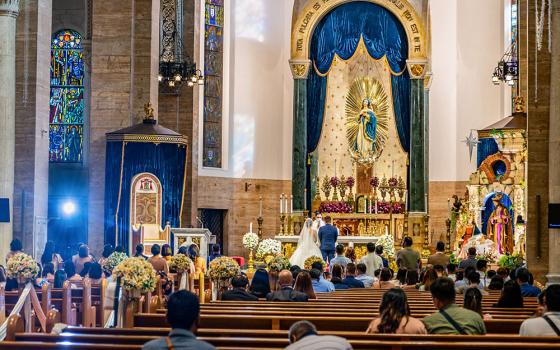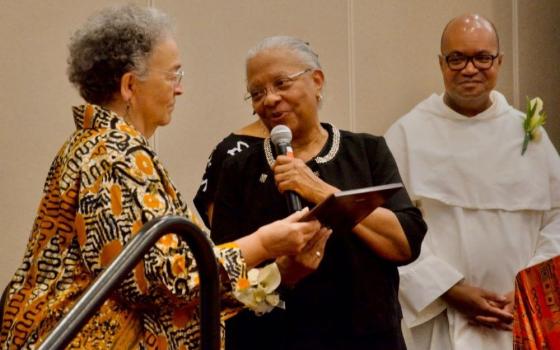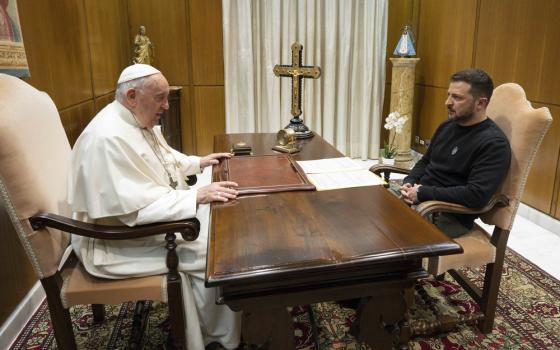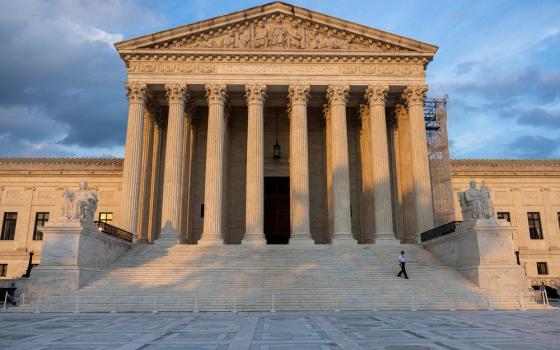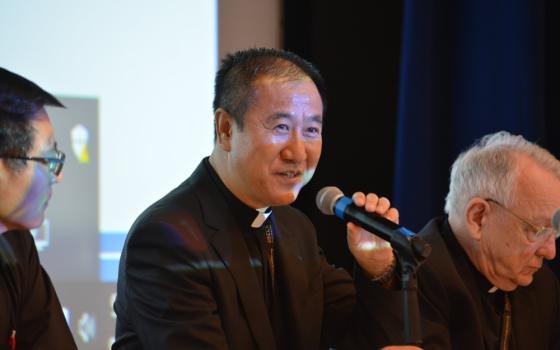
(Unsplash/Kelly Sikkema)
Every time I attended a consecrated woman's final profession, a priestly ordination or a Maundy Thursday I've heard this hymn sung as a psalm or recessional hymn without fail:
You are a chosen generation,
A royal priesthood, a holy nation,
A dedicated people.
That should show forth the praises of him
Who has called you
out of darkness
Into his marvelous light (1 Peter 2:9).
The women who accompanied Jesus (Luke 8:1-3), among them Susanna, provided for Jesus' ministry out of their resources. Perhaps these women felt recognized by Jesus for their willingness to support the hungry and thirsty people who came to listen to him as he went around preaching the good news.
I tend to imagine that when Jesus washed his disciples' feet, he was doing it in memory of Mary of Magdala. Maybe Jesus shifted the focus from personal conversion to a more universal gesture of consoling the grieving, mostly women and children of his time. Susanna and other women who followed Jesus were attuned to his compassionate heart.
Women expressed gratitude to Jesus by accompanying him and experiencing his non-calculating love, his kenosis, the unsparing giving of himself. This was indeed a marvelous symphony of love and charity — a profound message of Holy Thursday. These women could be called worthy of a "royal priesthood," a dedicated people.
When will outdated dogma keepers understand that Jesus never established a "priesthood" but rather a committed "servanthood" to love and serve, ordering them, "Do this …" when he stooped down to wash his disciples' feet?
By offering his body and blood, was Jesus embodying a constantly evolving nomadic community with a committed band of inspiring women seers? Was he embodying profound brokenness caused by structural injustices toward humans and creation? Was he indicating the expansive wisdom of being one cosmic community?
By providing from whatever Susanna and other women friends of Jesus had, they all become the eucharistic food and drink to the people in their ministry. They become priests in the order of Jesus.
Jesus paid the ultimate price for choosing the needs of the people over the dictums of the authorities. Jesus lived on in the hearts and minds of the people who knew that the higher value is love for one another rather than institutional laws.
Advertisement
As Catholic News Agency reported, Pope Francis, addressing the synodal assembly on Oct. 25, said that when clerics overstep their roles and "mistreat the people of God, they disfigure the face of the Church with macho and dictatorial attitudes." According to Francis, the people of God endure "the scorn, mistreatment, and marginalization of institutionalized clericalism." He called clericalism "a thorn," "a scourge," that "enslaves the holy, faithful people of God."
By washing his disciples' feet, Jesus initiated the courage to challenge the social system, which presumably he learned from Mary of Magdala. By "washing feet and having thanksgiving meals" Jesus modeled service to one another and nourishment of their spiritual beings.
Susanna, who provided from her resources, might have learned the reason to exist and provide for the people from her own resources. By walking alongside Jesus, Susanna was strengthening his followers with physical nourishment and daring courage. Susanna might have never dreamt that by accompanying Jesus she was building "ekklesia" — a kind of human community, comprising lepers, outcasts, foreigners and the most neglected women as "people of God."
While reading Elisabeth Schüssler Fiorenza’s book In Memory of Her, she mentions a present-day visualization of church as "ekklesia" not as a hypothetical model but as an ongoing process of moving forward with greater impartiality, autonomy, and accountability and toward communal forms of human interactions that are free of domination. As this online study guide states, "Her usage of ekklesia emerges from an understanding of the initial egalitarian social relations of the followers of Jesus, or a 'discipleship of equals.' "
According to the guide, Fiorenza mentions that in the Christian Scriptures, "ekklesia is not so much a religious as it is a civil-political concept, indicating an assembly of free citizens coming together in order to decide their own spiritual-political affairs." This is what the early Christians lived community life in God-ordained freedom.
With his reputation at stake, without giving much attention to the social strata of his time, Jesus publicly associated with women who were culturally considered second-class citizens. His welcome of Susanna into his ministry, might have been a great financial support to the poor people. Of course, Susanna too might have paid a heavy cost of following Jesus.
Susanna served Jesus with her genuine femininity, giving time and utilizing all her talents and resources. Susanna's integral participation in the early growing Christian community reveals Jesus' collaborative ministry of preaching, teaching and healing and performing miracles, which was witnessed by Luke, the evangelist, who mentioned her name in the Gospel. Maybe Jesus was trying to establish the ekklesia of women through the support of women like Susanna.
I wonder, why do we need male priests only to offer bread and wine on the altar? In reality, women are busy becoming bread and wine through their sweat and blood, feeding the poor and marginalized, and sheltering the people at the borders.
Given Pope Francis' radical stand through the process of synodality, will he give more emphasis on "living a eucharistic life" by becoming the Eucharist for the people — serving one another, being fully the Spirit of Jesus?
The church as an institution will not take us far where faith seekers are in search of soul-nourishing presence from spiritual leaders. The old patterns will work no more! The present pathetic condition of the church will become a radiant church only when women are allowed to voice their theological insights from the pulpit as women priests in the order of Susanna.
Pope Francis, please release the discipleship from its bondage of oppressive church leaders, injustice caused by inequality, superiority, clericalism, institutionalism and the sin of sexism. You can do it by bringing back permanent woman deacons to restore the ekklesia in its original form.
Jesus emboldened women to break the rules, not realizing that this act would result in breaking him. Today, every mature person, including LGBTQ individuals, fall into a chosen generation, a royal priesthood and dedicated people, called to proclaim his praises for having called us from the darkness of patriarchy and into the marvelous light of resurrection to grow into freedom.



